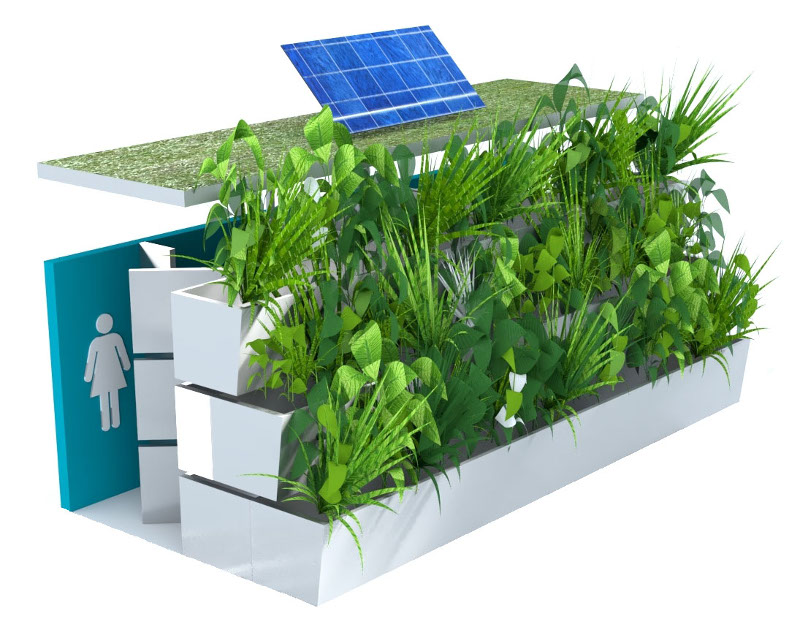LooPi - the autonomous unisex plant-based urinal for public spaces
Short Description
Status
ongoing
Starting point / motivation
European cities signalise their commitment to invest in green infrastructure in order to optimize climate in cities, increase biodiversity in urban areas, improve air and life quality and reduce noise pollution. Green areas need a lot of water for irrigation and use external fertilizer.
Simultaneously nutrient rich waste water is disposed via sewer systems, resulting in costs and energy demand. Waste water treatment often is insufficient, together with runoffs from agricultural fields resulting in eutrophication of coastal areas.
Contents and goals
alchemia-nova has developed a vertical ecosystem for decentralised greywater treatment in an EU research project (demEAUmed, FP7): "vertECO©". vertECO© green walls clean waste water to be reused as service water, saving water consumption and treating waste water with very low energy demand, as based on photosynthetic activity of the implemented plants.
In LooPi BETA VERSION this technology will be developed to a mobile, autonomous public plant-based urinal. Its waste water will be treated through an integrated green wall and can be reused for flushing. Urine is an excretion product rich in nutrients (mainly nitrogen and phosphorus).
LooPi BETA VERSION acts as a nature-based collection point for organic nutrients, and supports recycling of those ingredients. Through its decentralised, autonomous and energy efficient operating principle LooPi BETA VERSION supports resilience of cities. As concept idea LooPi already won two prizes: innovate4nature (focus on biodiversity), and Climate Launchpad (focus on climate change).
Design of LooPi BETA VERSION will be undertaken by the Viennese Design Company EOOS Design, who already have experience with conception of autonomous public toilets, whereby attractive and functional design is guaranteed, by what social acceptance of the unisex urinal interface is enhanced.
Methods
The goal of LooPi BETA VERSION ist development from TRL 4 to TRL 7. Laboratory experiments so far (project Kernkaskade) show insufficient nutrient uptake by the plants, as well as accumulation of salts contained in urine.
In LooPi BETA VERSION the storage of surplus nutrients/salts with modified bio-coal from fruit stone rests will be tested. The potential use of the enriched bio-coal as agricultural fertiliser will be tested in the project (project partner BOKU). If positive, the loop urban excretions- rural fertilizer can be closed, resulting in an effective circular economy approach.
Expected results
Following findings are to be expected: degradation rate through the seasons, binding of surplus ingredients on modified bio-coal from fruit stone rests and potential use as agricultural fertiliser, user behavior and transportation options, transfer to other (climatic) locations, market and customer preferences.
Project Partners
Project management
Mag. Theresa Heitzlhofer, alchemia-nova GmbH
Project or cooperation partners
- Priv.Doz. Dr. Markus Puschenreiter, Institute of Soil Research, University of Natural Resources and Life Sciences, Vienna
- DI Dr.techn. Roza Allabashi, Institute of Sanitary Engineering and Water Pollution Control, University of Natural Resources and Life Sciences, Vienna
Contact Address
Mag. Theresa Heitzlhofer
Baumgartenstrasse 93
A-1140 Vienna
Tel.: +43 (650) 824 94 20
E-mail: th@alchemia-nova.net
Web: https://www.alchemia-nova.net/

